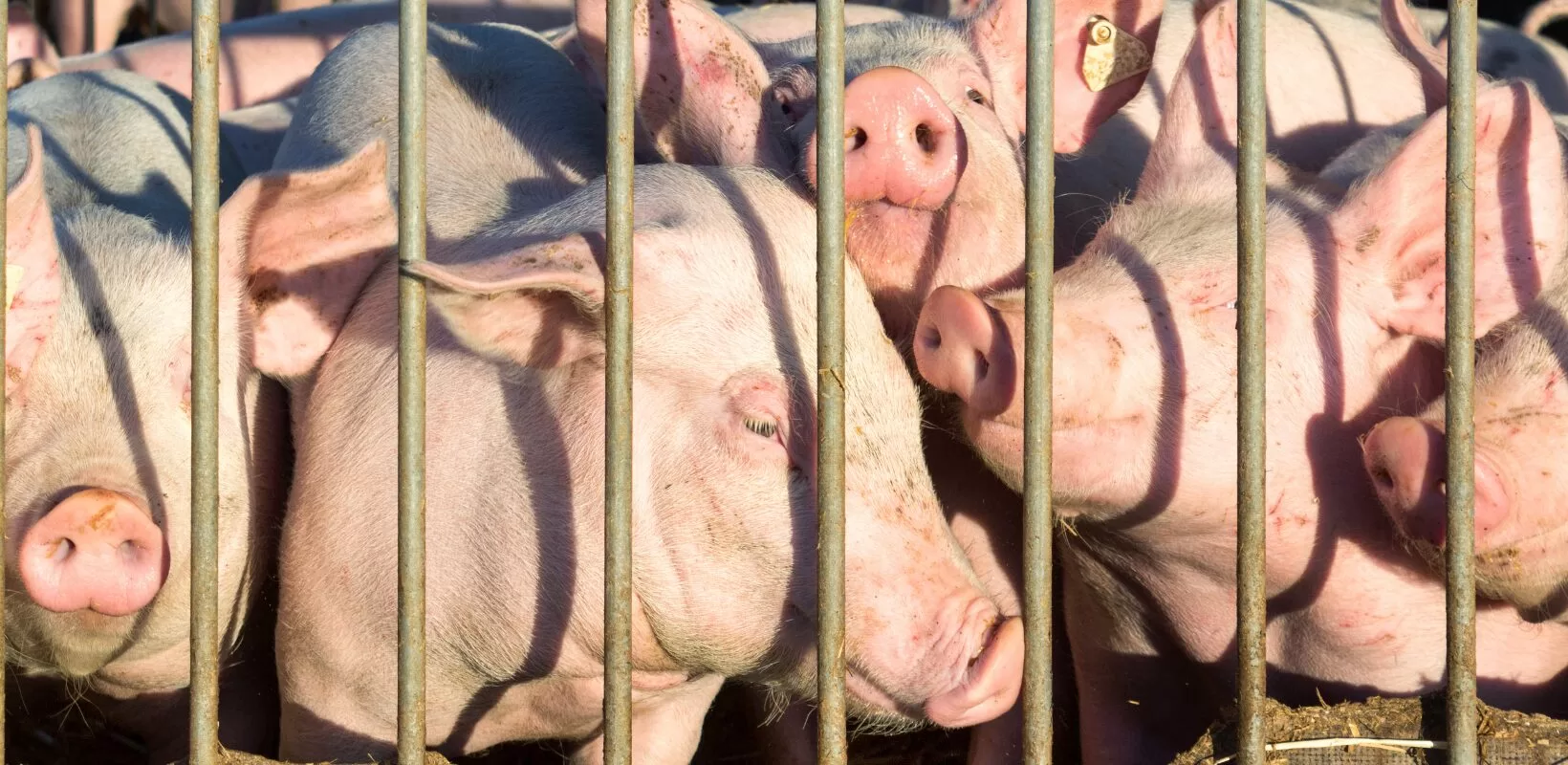Why We Care
In the U.S., most meat, dairy, poultry, and eggs are no longer produced on idyllic pasture-based farms. Instead, the vast majority of food animals are raised in industrial livestock operations, which are controlled by a handful of powerful multinational agribusiness corporations. Also known as factory farms or concentrated animal feeding operations (CAFOs), these facilities confine thousands—and sometimes millions—of animals without adequate space or access to open air or pasture. As a result of this extreme concentration of animals, industrial livestock operations pollute the environment, threaten public health, compromise animal welfare, damage local economies, and decrease the quality of life in surrounding communities.
These facilities are intentionally sited in rural areas where residents oftentimes lack the political and economic resources to effectively protect themselves. The operations are also disproportionately constructed near low-income and Black, Indigenous, and Latinx communities, constituting an egregious environmental injustice that has persisted for decades.

Environmental Impact
U.S. industrial livestock operations generate roughly 380 million tons of waste annually—almost 13 times more waste than the country’s human population. A single CAFO can easily produce as much waste as a city—but unlike municipalities, industrial livestock operations aren’t required to build sewage treatment facilities to safely process all this waste. Instead, it’s stored in open pits called “manure lagoons” and periodically applied untreated to surrounding land.
As a result of weak regulatory policies, waste is commonly mismanaged and overapplied, contaminating ground and surface waters with pollutants such as nitrogen, phosphorus, heavy metals, and pathogens like E. coli, Salmonella, and Cryptosporidium. This pollutes drinking water wells, causes fish kills, spawns toxic algal blooms, and renders local waterways unsafe for swimming, fishing, boating, and other recreational uses.
The facilities have a similarly harmful impact on air quality. Confinement buildings, lagoons, and the processes of spraying or spreading waste on fields collectively emit a host of hazardous air pollutants, including ammonia, hydrogen sulfide, particulate matter, volatile organic compounds (VOCs), and harmful microorganisms. The operations also produce greenhouse gases like methane, nitrous oxide, and carbon dioxide.

Public Health Impact
Extensive scientific literature documents the harmful public health impacts of industrial livestock production. Exposure to the chemical cocktail of air and water pollutants described above puts workers and surrounding communities at risk of acute and chronic health conditions, including bacterial infections, respiratory disease, birth defects, and cancer.
Health impacts aren’t limited to those living nearby. Industrial livestock operations contribute to widespread antimicrobial resistance due to the regular administration of nontherapeutic antibiotics to confined livestock to promote growth and prevent disease. This causes the proliferation of antibiotic-resistant bacteria, which has reduced the effectiveness of medically important antibiotics used to treat humans. Experts also warn that factory farms increase the risk of zoonotic transfer of emerging diseases from animals to people.
The public health threats posed by industrial livestock operations are so serious that in 2019, the American Public Health Association called for a moratorium on the construction of new CAFOs until regulations and enforcement measures are strengthened to sufficiently protect the public.

Socioeconomic Impact
Industrial livestock operations have devastating impacts on the economic and social fabric of rural communities. These facilities bring pollution and health threats, decimating local property values, eliminating tourism, compelling existing residents to leave, and discouraging others from moving in. Because they import feed and supplies from outside the community and create only a few dangerous, low-paying jobs, factory farms provide little economic benefit to offset the damage they cause. In fact, they often force communities to bear new costs, like increased road repair expenses due to heavy truck traffic.
While independent farmers have long served as pillars of rural communities, industrial livestock operations are typically controlled by corporations that have no vested interest in the wellbeing of those living nearby. Social scientists have found that factory farms cause a loss of social cohesion while dramatically reducing the quality of life of neighbors, who can’t even open their windows, host guests, or enjoy sitting outside.

Animal Welfare
Farmers have long understood that sound animal husbandry benefits both producers and animals; healthy animals in low-stress pastured systems provide high-quality foods. However, the industrial livestock model prioritizes profit over the health and wellbeing of people and animals—and over the quality of food produced.
Factory farms cause needless suffering by confining animals in stressful, overcrowded conditions without access to natural light, fresh air, or pasture. Livestock may not have space to turn around, and birds are often unable to spread their wings. Animals are also prevented from engaging in natural behaviors like rooting, wallowing, and foraging, and are often subject to painful procedures like debeaking and tail docking.

Solution: Socially Responsible Agriculture
Though the damages of industrial livestock production are disheartening, a different approach to agriculture is entirely possible—in fact, it’s been in existence for thousands of years and continues to be practiced by a growing number of socially responsible farmers today. By raising animals on pasture using practices that protect the environment, human health, and animal welfare, these farmers are strengthening their communities and transforming our food system. Socially responsible agriculture can rebuild critically needed topsoil, reduce water and air pollution, strengthen rural economies, and support human health and food security, all while providing climate resiliency. With socially responsible agriculture, we all thrive.
SRAP not only provides communities with the knowledge and skills to protect their right to clean water, air, and soil and a vibrant future, but we also work to help them replace industrial livestock production with ecologically sound, socially equitable, and economically viable animal agriculture.
